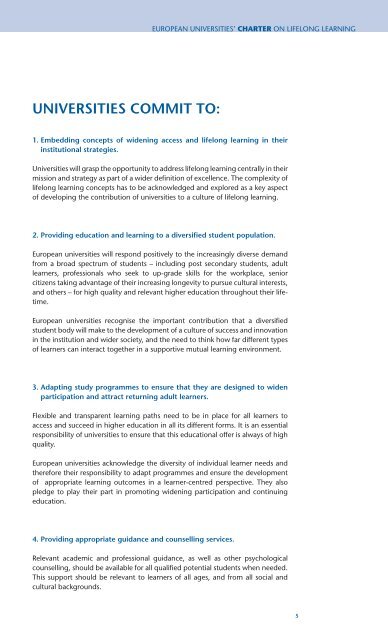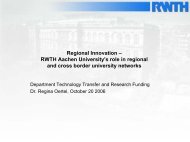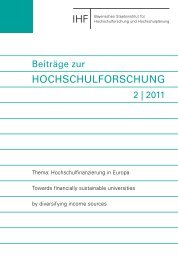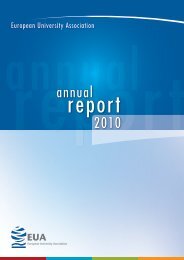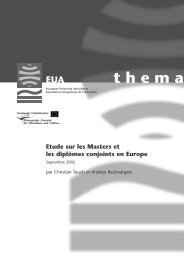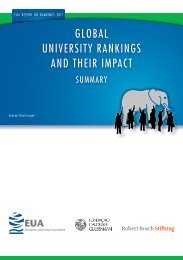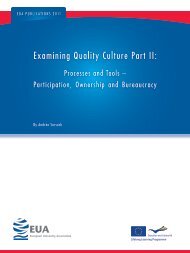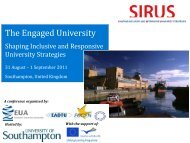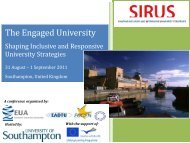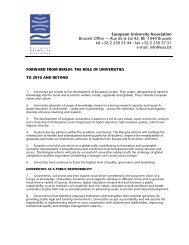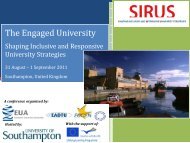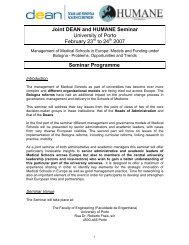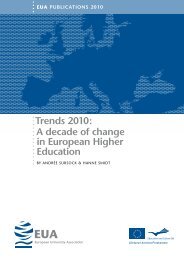Charter on Lifelong Learning - European University Association
Charter on Lifelong Learning - European University Association
Charter on Lifelong Learning - European University Association
Create successful ePaper yourself
Turn your PDF publications into a flip-book with our unique Google optimized e-Paper software.
UNIVERSITIES COMMIT TO:<br />
1. Embedding c<strong>on</strong>cepts of widening access and lifel<strong>on</strong>g learning in their<br />
instituti<strong>on</strong>al strategies.<br />
Universities will grasp the opportunity to address lifel<strong>on</strong>g learning centrally in their<br />
missi<strong>on</strong> and strategy as part of a wider definiti<strong>on</strong> of excellence. The complexity of<br />
lifel<strong>on</strong>g learning c<strong>on</strong>cepts has to be acknowledged and explored as a key aspect<br />
of developing the c<strong>on</strong>tributi<strong>on</strong> of universities to a culture of lifel<strong>on</strong>g learning.<br />
2. Providing educati<strong>on</strong> and learning to a diversified student populati<strong>on</strong>.<br />
<strong>European</strong> universities will resp<strong>on</strong>d positively to the increasingly diverse demand<br />
from a broad spectrum of students – including post sec<strong>on</strong>dary students, adult<br />
learners, professi<strong>on</strong>als who seek to up-grade skills for the workplace, senior<br />
citizens taking advantage of their increasing l<strong>on</strong>gevity to pursue cultural interests,<br />
and others – for high quality and relevant higher educati<strong>on</strong> throughout their lifetime.<br />
<strong>European</strong> universities recognise the important c<strong>on</strong>tributi<strong>on</strong> that a diversified<br />
student body will make to the development of a culture of success and innovati<strong>on</strong><br />
in the instituti<strong>on</strong> and wider society, and the need to think how far different types<br />
of learners can interact together in a supportive mutual learning envir<strong>on</strong>ment.<br />
3. Adapting study programmes to ensure that they are designed to widen<br />
participati<strong>on</strong> and attract returning adult learners.<br />
Flexible and transparent learning paths need to be in place for all learners to<br />
access and succeed in higher educati<strong>on</strong> in all its different forms. It is an essential<br />
resp<strong>on</strong>sibility of universities to ensure that this educati<strong>on</strong>al offer is always of high<br />
quality.<br />
<strong>European</strong> universities acknowledge the diversity of individual learner needs and<br />
therefore their resp<strong>on</strong>sibility to adapt programmes and ensure the development<br />
of appropriate learning outcomes in a learner-centred perspective. They also<br />
pledge to play their part in promoting widening participati<strong>on</strong> and c<strong>on</strong>tinuing<br />
educati<strong>on</strong>.<br />
4. Providing appropriate guidance and counselling services.<br />
EUROPEAN UNIVERSITIES’ CHARTER ON LIFELONG LEARNING<br />
Relevant academic and professi<strong>on</strong>al guidance, as well as other psychological<br />
counselling, should be available for all qualified potential students when needed.<br />
This support should be relevant to learners of all ages, and from all social and<br />
cultural backgrounds.<br />
5


